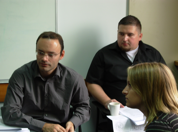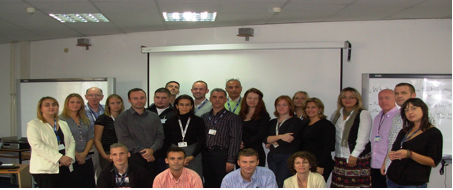Ted Feifer and Maria Jessop led a workshop focused on mediation for 23 international and national staff members of the Organization for Security and Cooperation in Europe (OSCE) Mission in Kosovo, in Pristina, September 9-11, 2009.
Ted Feifer and Maria Jessop led a workshop focused on mediation for 23 international and national staff members of the Organization for Security and Cooperation in Europe (OSCE) Mission in Kosovo, in Pristina, September 9-11, 2009. The international staff came from Moldova, Armenia, Georgia, Ireland, Austria, Spain, France and the United Kingdom. Participants worked at Headquarters and Regional Centers Gnjilane, Mitrovica, Pec, Pristina, and Prizren. Some participants were at an advanced practitioner stage, using mediation on a daily basis in implementing multi-ethnic projects, and working with minority groups and local government authorities. Others, however, were being introduced to mediation for the first time.
This workshop sought to help participants gain a better understanding of the role of a mediator, mistakes mediators make, operating as a mediator, transforming conflict, setting up and bolstering a mediation process, and addressing problems facing mediators. Facilitators utilized in the training interactive discussions, small group exercises, videos, role plays, and a final multi-party, complex simulation involving possible multiple mediators in a local political-economic problem.
Participants found different things to draw from the program, based on their experience working as a mediator. A newcomer to mediation noted that this was the first such workshop he had attended and appreciated the clear explanation offered on the mediation process. Others appreciated the “practical, concrete and useful” information provided in setting up a mediation process. The exercises based on real life situations were seen as particularly useful in helping participants prepare to meet future mediation challenges.




